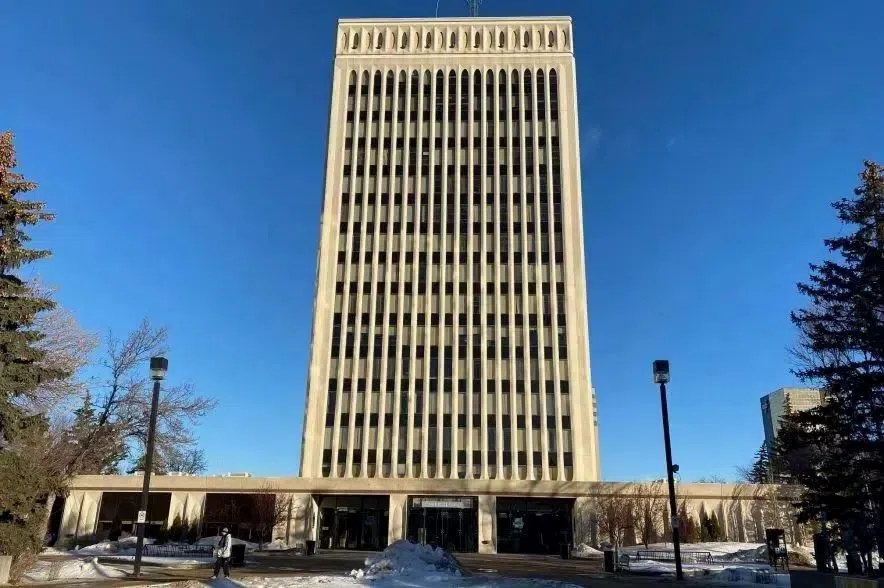The City of Regina’s Audit and Finance Committee on Tuesday discussed the 2023 preliminary year-end results — and how to move forward with Regina Exhibition Association Limited (REAL).
On Friday, it was revealed that REAL was required to pay back $8 million following an audit by the Canada Revenue Agency (CRA).
According to the city’s agenda for the committee meeting, REAL and Economic Development Regina (EDR) received funds from the Canada Emergency Wage Subsidy (CEWS), which was created in 2020 to help businesses retain their employees.
The agenda said EDR was required to pay back $918,000.
A city memo that was leaked on social media said both REAL and EDR were not eligible for the funds and both will have to pay interest. Both organizations have asked to waive the interest costs.
The memo added that REAL used the funds to support efforts such as the Saskatchewan Health Authority’s drive-thru COVID-19 testing centre, the SHA’s drive-thru COVID vaccination centre, and a field hospital for COVID overflow.
It also said REAL used the money to support sport and recreation opportunities as well as maintenance, deep cleans and building upgrades.
Deputy city manager Barry Lacey said REAL and EDR will be at council within the next month to discuss the amounts they owe and how they will be repaid.
Last year, council decided to absorb Tourism Regina from REAL. Shortly afterwards, council voted to remove REAL’s board of directors.
Surplus is now a deficit
The agenda for Tuesday’s meeting stated that city administration is recommending that council provide REAL with $232,259 in order to cover the cost of REAL supporting the catalyst committee.
It would have been paid for through the 2023 general operating fund, which had a surplus of $1.7 million based on the agenda.
However, at the beginning of Tuesday’s meeting, Lacey presented council with new findings that had been discovered after Friday when the agenda was posted.
He said that the year-end results show the general operating fund has a deficit of $2.7 million.
He said increased there were costs related to winter road maintenance, the emergency shelter and related expenses.
Lacey said another major factor was increased interest costs to a portion of REAL’s debt that council committed to fund when it was approved.
“This change (from $1.7-million surplus to $2.7-million deficit) was due to an error that was discovered after the report was released on Friday relating to the allowance for doubtful accounts not having been set up properly, which had an impact of $4.4 million on the operating results,” Lacey said.
Committee member Robert Humphries asked Lacey to explain in clear terms what an allowance for doubtful accounts is.
“An allowance for doubtful accounts is established when there is reason to believe that (an) entire receivable or a portion of that receivable may not be collectible,” Lacey explained. “This is a provision to make sure that the financial statements reflect fairly the revenues that the city actually expects to receive.
“It basically takes what we’ve invoiced less what we believe might be uncollectible and gives you that net difference. The estimate of the uncollectible is allowance for doubtful accounts.”
Under questioning by Mayor Sandra Masters, Lacey said those accounts were attached to property taxes and sundry receivables – which is anything not related to property taxes and utilities like parking and lease payments for city properties leased to third parties.
Under the Cities Act, Regina is required to balance its budget.
Lacey said the proposed $230,000 payment would add to the $2.7-million deficit.
It was suggested by the agenda that the deficit be paid through the utility operating fund, which had a $4.1-million positive variance from budget.
“As a resident, based on what’s transpired at REAL over the past number of months and years, I’m not sure why any resident would trust the cost REAL claims it incurred to support work done by the catalyst committee,” Humphries said.
“But seeing no other options, I will reluctantly vote yes to forward the recommendation to city council.”
Humphries later moved that city council direct administration to return to May’s Audit and Finance Committee meeting outlining measures and implications where the $2.7-million operating deficit and proposed $232,259 payment to REAL would be covered by drawing down surpluses in other city reserves that exceeded maximum balances.
The motion also recommended that this be approved at April 24’s council meeting.
It passed unanimously.











